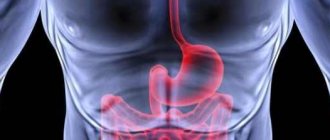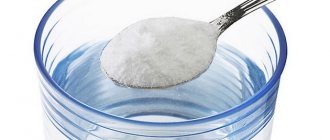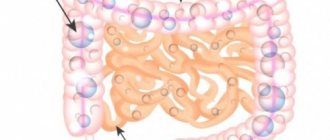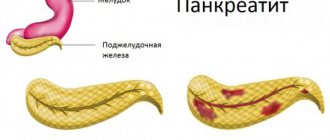Published 01/16/2020 · Comments: · Reading time: 6 min · Views: Post Views: 15,955
You cannot sit idly by and wait for constipation to go away on its own. Long-term retention of stool, in addition to causing psychological inconvenience, causes physical suffering, and causes the development of complications. One of them is fecal stones in the intestines - hard accumulations of compacted fecal matter.
In advanced cases, the only treatment option may be surgery. Who is predisposed to such a problem, how to remove fecal stones at home? We will answer in this article.
Causes
Most often, intestinal stones form in older people, whose intestinal system is subject to age-related changes. In addition, people with health problems are at risk:
- atony or hypotension of the rectum;
- Parkinson's disease;
- persons who abuse fatty foods.
The main causes of stones are:
- unbalanced diet, abundance of unhealthy foods, fast food, sweets;
- passive lifestyle;
- alcohol abuse and smoking;
- accidentally eaten bones of berries, fish or animals;
- undigested food remains;
- penetration of foreign objects, tablets, hairs into the colon.
It has been proven that coprolites are formed when antacid drugs are used in large doses. Under the influence of bacteria, residual particles undergo rotting for a long time and collect into lumps.
If fecal deposits are not removed in a timely manner, the process may worsen. This will lead to intestinal obstruction, which can only be cured by surgery.
Symptoms
The main symptoms of stone formation are:
- haemorrhoids;
- chronic constipation;
- fatigue and weakness;
- low performance;
- nausea;
- pain and discomfort in the epigastric region;
- bloating and flatulence after eating;
- heaviness in the stomach;
- heartburn;
- headache;
- dysbiosis.
Heavy coating of the intestinal walls with feces contributes to the formation of the so-called plug. This plug blocks the intestinal lumen and disrupts intestinal motility. As a result, unpleasant symptoms and discomfort appear. At the initial stage of the formation of stones in the lumen, a deterioration in the functioning of the gastrointestinal tract is observed, but when the formations become larger, they poison the body from the inside, having a negative effect on other internal organs.
Reasons for education
- poor nutrition – a large amount of preservatives, fatty acids and other harmful substances in the dishes consumed;
- uncontrolled use of certain medications - hormonal drugs, antibacterial agents, antacids, analgesics;
- constant psycho-emotional arousal, frequent stressful conditions;
- physical inactivity, low level of physical activity;
- violation of water and electrolyte metabolism in the body;
- entry into the digestive system of foreign bodies - chewing gum, small fruit seeds, etc.;
- atonic states - decreased peristaltic activity of the intestine;
- the formation of stones in the gall bladder and their penetration into the gastrointestinal tract.
Be sure to read: Volvulus (intussusception): symptoms, causes and treatment
What is the danger?
Fecal stones lead to disruption of intestinal functions and slower intestinal motility.
This pathology leads to the development of the following complications:
- chronic constipation;
- autoimmune diseases;
- allergic reactions;
- general intoxication of the body;
- the appearance of malignant tumors localized in the rectum.
Among the most dangerous complications of fecal stones for the patient, doctors identify internal bleeding and intestinal obstruction. [adsen]
How to cleanse the intestines of fecal stones?
For small-sized fecal stones, doctors prefer to use conservative treatment methods.
For these purposes, the following therapeutic techniques are used:
- Siphon enemas.
- Taking laxatives (used only periodically to avoid addiction).
- Cleansing enemas that improve intestinal permeability. Microenemas and enemas with decoctions of such medicinal herbs as motherwort, linden blossom, and chamomile have a good effect. It is recommended to do enemas daily for a week, then take a week break and repeat the treatment course again.
Such an effective procedure as hydrocolonoscopy deserves special attention, it promotes the maximum passage of feces from the intestinal walls and allows you to cleanse the intestines. The use of glycerin suppositories has a good effect. This method of treatment is especially recommended in the presence of fecal stones in young patients.
Enemas
You can eliminate feces in the intestines using folk remedies. An enema is one of the accessible and simple ways to remove accumulated toxins yourself.
- Ognev's enema. The cleaning method was invented by the domestic doctor Ognev. To prepare, you will need a glass of hydrogen peroxide 3%, a glass of glycerin, 200 g of soap and ½ glass of dry wine. After douching, the patient remains in a lying position for a quarter of an hour. During the cleansing process, a burning sensation may occur. This method is prohibited for inflammatory processes in the colon, as well as for diseases of the sigmoid and colon.
- An enema based on pumpkin honey provides gentle and gentle cleaning. First, you should cleanse with a regular enema consisting of water. Then prepare a mixture consisting of 300 g of honey and a glass of warm water. The resulting solution is injected into the rectum and left for 30 minutes. The procedure is carried out over 5-7 days. This method can painlessly remove seals, as well as cure some skin pathologies and papillomas.
- Cleaning based on olive and sea buckthorn oils, as well as using Vaseline, vegetable or hemp oils. Oils are used separately, not in combination with each other. The procedure will require about 100 g of the ingredient, warmed to room temperature. This enema has an enveloping effect on stones, facilitates their easy removal, and does not have an irritating effect on the intestines. The patient must remain in a lying position for 30 minutes.
Causes of constipation
Constipation is a condition where bowel movements do not occur within 48 hours.
Constipation is a condition of the body in which bowel movements do not occur for 48 hours or longer.
It was believed that intestinal obstruction was a problem for older people who had crossed the 60-year threshold, but medical statistics say the opposite; more and more young people and even children began to address the delicate issue.
The appearance of constipation not only negatively affects the process of defecation, stimulating the formation of hemorrhoidal cones, but also reduces the protective function of the body.
If a problem occurs, you can use a colon cleanse at home using a regular enema.
But often resorting to such a procedure is not recommended. Constant artificial washing of stones from the intestines gradually relaxes the muscles and contributes to disruption of peristalsis. The result is problems with the natural release of toxins from the body. Therefore, it is important to use a colon cleanse only when necessary.
The process of intestinal blockage develops due to various factors:
- Metabolic disorders.
- Poor quality, unbalanced food, rich in proteins and fats, lacking nutrients and fiber.
- Frequent stress, fatigue.
- Changes in the normal functioning of the small intestine, problems with peristalsis.
- Intensive absorption of fluid by the intestinal walls, which makes it difficult for feces to pass through the pipes.
- The presence of congenital pathologies of intestinal development, the presence of diseases such as Hirschsprung's disease, as well as the presence of excess intestinal length in a person.
- A sedentary lifestyle, in which a person becomes physically weak.
- The period of pregnancy and breastfeeding in women.
- Problems with excess weight.
- Hemorrhoids of various types, as well as cracks that form in the external cavity of the anus.
- Inflammatory processes of the digestive organs that prevent the movement of digested food through the intestines: hernia, neoplasm.
- Worm infestations blocking the passage.
Any reason stimulates the appearance of specific symptoms and general malaise in a person. The occurrence of signs of obstruction should not be ignored.
Prolonged stagnation of feces in the intestines leads to severe intoxication, which, if left untreated, leads to death.
Siphon enema
This type of enema involves the use of a large amount of liquid at a relatively fast pace for emergency lavage of the colon according to the following indications:
- Ineffectiveness of a standard enema.
- Intestinal obstruction.
- Emergency removal of toxins.
Technique:
Water is poured in 1 - 2 liters at a time; you will need a ladle of the appropriate size. A glass mug requires no less volume. The patient takes the desired position (for example, on the right side with his knees tucked), the doctor inserts a tip lubricated with Vaseline to a sufficient depth. The literature gives a value of 30-40 cm; it is necessary to take into account the anatomical features of the person for obvious reasons.
Excluding the ingress of air, the volume of the ladle is pumped into the colon. Then the mug is lowered, the contents need to be poured into a collection container. The procedure is repeated 10-12 times. The number of repetitions should be maintained, even if the wash water is clean. For the most part, the procedure eliminates constipation.
Folk remedies
Traditional medicine, more than ever, has its own approach to getting rid of fecal stones at home.
- Castor oil . To prepare a cleanser, you should take castor oil at the rate of 1 gram per 1 kilogram of human weight. Heat the oil using steam. Squeeze lemon juice in an amount of 2 parts juice to 1 part oil. Quickly drink warm oil and wash it down with lemon juice. Do not eat or drink anything for 12 hours after taking the medicine. It is better to carry out the procedure at night; in case of severe nausea, you can chew a little raisins. Cleansing begins after 2 hours, and removal of toxins after 12 hours.
- Vodka with oil . Combine 40 milliliters of unrefined sunflower oil and 20-40 milliliters of vodka in a tightly closed container. Close the container tightly and shake by shaking for 5 minutes. Open and drink everything as quickly as possible. This mixture should be drunk 3 times a day 30 minutes before meals. Try to alternate applications at equal intervals. Use the mixture for medicinal purposes for 10 days in a row. Take a break for 5 days and repeat the oil-vodka course again. After the third course, take a break for 2 weeks. If necessary, repeat this treatment circle for up to 2-3 years.
- Oatmeal and rice porridge . Take equal amounts of rice and oats. Boil both cereals in salted water. You need to eat this porridge in the morning and evening for a week. This medicinal porridge removes the remains of undigested food, fecal stones, heals cracks in the intestinal mucosa, perfectly cleanses this organ, and increases its tone.
- Glycerin suppositories . You can cope with coprolites without an enema by using glycerin suppositories. These are rectal suppositories, thanks to which you can delicately cleanse the intestines of stones. They soften stones, eliminate painful bowel movements, and improve intestinal function. The use of glycerin suppositories is contraindicated for anal fissures and exacerbation of hemorrhoids.
- Prune infusion . Wash 100 g of prunes, pour 0.5 liters of boiling water over them, let it brew. Drink a glass of infusion 3 times a day. Prunes perfectly cleanse the intestines, fight constipation, remove discomfort in the stomach, and normalize metabolism.
The main complication of fecal stones is the occurrence of intestinal obstruction (partial or complete).
Important questions
People suffering from urolithiasis always have questions related to the duration of stone removal and the consequences of this process.
How long does it take for a stone to come out?
The period may take from several days to 2-3 weeks. But delays are possible due to the size of the stones. Therefore, the answer depends on the person’s condition.
What to do if a pebble comes out when urinating
In this case, it is better to immediately contact a urologist in order to adequately assess the condition of the kidneys and the genitourinary system as a whole. In most cases, stones do not exceed a centimeter in diameter. You should not throw them away - it is better to save them for demonstration to the doctor.
How long does the pain last after the stone passes?
Pain lasts for 1-1.5 hours and is usually relieved with antispasmodics. But as a result of complications against the background of inflammatory processes, pain and cramping may appear after this for several days.
Why did the temperature rise after the stone passed?
The phenomenon may be due to the fact that other stones, larger or smaller, remain in the ureter. Also, an increase in temperature occurs due to ongoing inflammatory processes in the kidney and ureter. In any case, you should not self-medicate - it is important to consult a urologist as soon as possible.
Medicinal colon cleansing
Cleansing the intestines from fecal stones using medications can be done in any specialized medical institution where it is possible to carry out this procedure in a hospital setting under the supervision of a competent doctor. For this purpose, ordinary boiled water is used, introduced into the anus through an enema.
It should be noted that doctors resort to this procedure only in the most extreme cases, when the problem that has arisen has to be solved against the background of intoxication of the body. It is also necessary to take into account the fact that enemas wash out beneficial microorganisms from the intestinal microflora along with toxins, which carry the function of processing and assimilation of food.
Even if instead of boiled water, decoctions of medicinal plants or boiled oil are used. This method is not suitable for people who have undergone intestinal surgery or suffer from bleeding of internal organs or hemorrhoids. After the intestines are washed, you should think about restoring its microflora, for which it is recommended to take drugs such as Bifidumbacterin or Linex.
The most gentle method of intestinal cleansing is the use of laxatives, which are produced today in a wide variety in the form of suspensions, mixtures, suppositories, and tablets. The principle of action of all laxatives is based on enveloping the intestinal walls with a film that prevents the absorption of fluid. The result of this process is spontaneous liquefaction of stool, followed by its removal from the body, 6-7 hours after taking the laxative.
However, we should not forget that medications with a laxative effect contribute to the leaching of potassium from the body, which is necessary for the full functioning of the heart muscle. This should be kept in mind by persons suffering from cardiovascular insufficiency, and bowel cleansing should be carried out in this way only if there is no other way to get rid of constipation and restore full bowel function.
Why do fecal stones appear?
In general, the intestinal walls become clogged with feces due to disturbances in the functioning of the gastrointestinal tract. This usually happens to those who have already celebrated their 40th birthday. Although, as doctors say, there is now a clear trend towards rejuvenation of this problem. The reason lies in the temptations waiting at every step to eat at least a piece of tasty, but completely unhealthy food.
No matter how trivial it may sound, it is the wrong diet that is the main cause of all gastrointestinal diseases. Despite the fact that a healthy lifestyle is now more fashionable than ever, most people in the country stick to old habits. And this is an abundance of fried and fatty foods, fast food, instant foods... Sooner or later, all this will certainly end up on the walls of the intestines in the form of unpleasant and life-damaging fecal stones.
The formation of feces can also be caused by accidentally swallowing a piece of animal or bird bone, fruit pit or any other solid particles. They often cannot exit naturally, and the body is unable to digest them.
As a result, fecal stones begin to form in the intestines, one or several at once. This occurs due to compaction of the stool. In the process, it can combine with mucus. In this case, accumulations in several layers are obtained.
Attention!
The weight of fecal stones can reach up to 2 kg.
What to do if you are bothered by fecal stones in the intestines, how to get rid of them, will be discussed further.
Prevention
Having been freed from coprolites and accompanying symptoms, a person should feel better and the functioning of internal organs should improve. From now on, it is necessary to adhere to certain rules in order to avoid the recurrence of the disease. Preventive measures look like this:
- limiting the consumption of fatty, spicy, salty foods that cause constipation;
- drinking at least 2 liters of liquid per day (boiled water, juices, green tea, compotes);
- rejection of bad habits;
- maintaining an active lifestyle, performing moderate physical activity;
- regulation of nutrition - adherence to the regime and measures in food;
- including more fresh fruits and vegetables in the diet;
- tracking bowel regularity.
If you experience intestinal bleeding or prolonged constipation, you should consult a doctor.
About prevention
Prevention of the formation of fecal stones begins with adherence to the principles of proper nutrition . It is recommended to limit the content of fatty and meat dishes in the area as much as possible. Every day you need to eat vegetables and fruits rich in plant fiber.
Consume foods such as eggs, rice, baked goods, pasta and chocolate in moderation, as they can cause fecal stones. But green tea, nuts, oatmeal and bran should always be on your table!
In addition, you must follow the following recommendations from doctors:
- drink at least 2 liters of liquid throughout the day;
- avoid overeating;
- deal with constipation in a timely manner, if necessary, use cleansing enemas;
- play sports, lead an active lifestyle;
- Do not take medications without a doctor’s prescription.
Compliance with these recommendations and regular visits to a gastroenterologist for preventive purposes will maximally protect you from such an unpleasant disease as fecal stones!
Sovinskaya Elena, medical observer
56, total, today
( 187 votes, average: 4.57 out of 5)
Rectal prolapse: treatment at home
Ulcerative sigmoiditis: causes, symptoms, treatment











